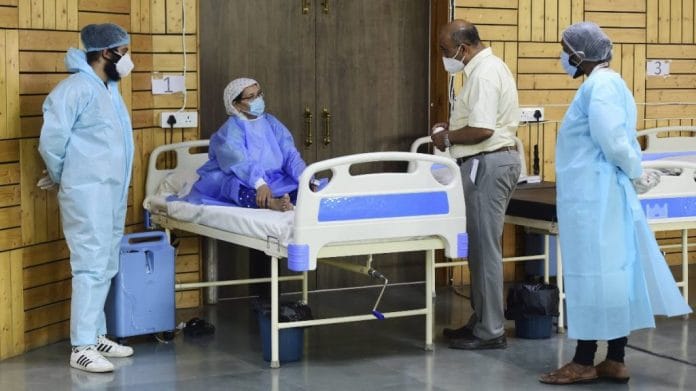New Delhi: There is a need to increase vaccine manufacturing and availability across the world to contain the current Covid-19 crisis, an independent global panel report has concluded.
The final report of the Independent Panel for Pandemic Preparedness and Response (IPPPR), released Wednesday, also took note of the fact that while India is one of the largest vaccine manufacturers in the world, it has been lagging in vaccine production and delivery.
Constituted by World Health Organization Director-General Dr Tedros Adhanom Ghebreyesus in May 2020, IPPPR is a 13-member independent panel headed by former prime minister of New Zealand Helen Clark and the former president of Liberia Ellen Johnson Sirleaf. Preeti Sudan, India’s former health secretary, is also a member of the panel that was created to come up with a framework to effectively address global health threats.
In its report titled ‘COVID-19: Make it the Last Pandemic’, the panel highlighted the reasons behind the devastating surge of Covid-19 in several parts of the world and also gave suggestions on curbing the present crisis and avoiding a similar outbreak in the future.
According to the report, the progress in sharing know-how, licensing and intellectual property on Covid vaccines has been slow.
It called for vaccine-producing countries and manufacturers to voluntarily agree to licensing and technology transfer of vaccine technology, adding that if not done within three months, intellectual property waivers should come into effect immediately.
South Africa and India have been consistently pushing for a waiver on intellectual property rights at the World Trade Organization, which will allow generic manufacturers to make Covid vaccines. While the proposed waiver got support from the US, the WTO is yet to make a decision on the same.
The IPPPR report also called for high-income countries to help low- and middle-income countries with vaccines.
“High income countries with a vaccine pipeline for adequate coverage should, alongside their own scale up, commit to provide to the 92 low- and middle income countries of the COVAX Gavi Advance Market Commitment at least one billion vaccine doses no later than 1 September 2021 and more than two billion doses by mid-2022,” the report said.
It also said that the G7 countries should immediately “commit to provide 60% of the US$19 billion” that is required by Access to COVID-19 Tools (ACT) Accelerator or ACT-A —an initiative launched by the WHO to develop tools to fight Covid — for vaccines, diagnostics, therapeutics, and strengthening of health systems.
Also read: WHO hasn’t associated term ‘Indian Variant’ with B.1.617 Covid strain, health ministry says
Failure of global institutions fuelled Covid surge
According to the IPPPR, the aggressive surge of Covid-19 in several parts of the world occurred because of the failure of global institutions.
“Too many countries took a ‘wait and see’ approach rather than enacting an aggressive containment strategy that could have forestalled the global pandemic,” noted the report.
The global panel also highlighted that despite the growing threat of the virus, not only was the response delayed but in several countries it was “characterized by a lack of coordination, inconsistent or non-existent strategies, and the devaluing of science in guiding decision-making”.
It said that while clinicians in China’s Wuhan were quick to spot unusual clusters of pneumonia of unknown origin in late December 2019, the formal notification and emergency declaration procedures under the International Health Regulations were extremely slow.
Additionally, even after a Public Health Emergency of International Concern (PHEIC) was declared on 30 January 2020, many countries failed to take an aggressive approach to tackle the virus.
“As COVID-19 spread into more countries, neither national nor international systems managed to meet the initial and urgent demands for supplies,” the report noted.
It added that there was an absence of a coordinated and global leadership, and the “dedicated financing” that was required to respond to the pandemic was also unavailable.
In order to tackle these shortcomings, the IPPPR recommended setting up a new global system for surveillance.
It further noted that heads of state and government should adopt a political declaration at a global summit, under the auspices of the UN General Assembly, to commit to these reforms.
During the virtual release of the report Wednesday, Johnson Sirleaf, co-head of the panel, said: “Our message is simple and clear: the current system failed to protect us from the COVID-19 pandemic. And if we do not act to change it now, it will not protect us from the next pandemic threat, which could happen at any time.”
He added: “The shelves of storage rooms in the UN and national capitals are full of reports and reviews of previous health crises. Had their warnings been heeded, we would have avoided the catastrophe we are in today.”
Also read: Covid pandemic: England now open to hugs, Brazil suspends AstraZeneca for pregnant women






